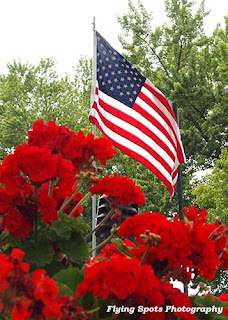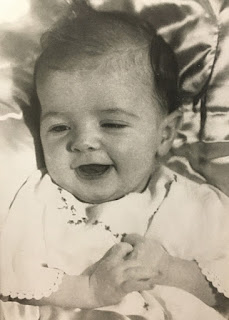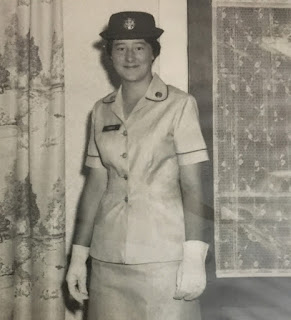Be that as it may, I believe July 4th should be a celebration of all veterans who gave so much in ALL wars. In that light, I would like to remind everyone of those precious men and women who fought in WWII. I feel very honored to be in possession of two photo albums my mother (now deceased) left to me. I was born just 5 months before V.E. Day, in LaPorte, Indiana, where my father worked in a bomb factory. I have been back there to see the little house my parents lived in then, one of many in a government housing area called Kingsford Heights. What is left gives me goosebumps … many of those little houses gone … those left now remodeled and lived in by ordinary people. The government school there sits empty, but I can “hear” the ghostly laughter and screams of the children who once were students there.
A rusted old train engine and a couple of train cars that were used to haul supplies to the bomb factory and haul bombs out of it, sit abandoned on a train track overgrown with grass and weeds. The buildings for the bomb factory sit spread across a field and are now used for storage, probably by farmers. (Different types of bombs were made in different buildings so that if one blew up, the other buildings would not be affected.) And across those same fields are little hills where there used to be bunkers for storing the bombs, partly for safety, and partly so that in case of an invasion from Germany, they would not be visible from the air. I remember my father saying employees had to wear special rubber shoe protection and hair nets to avoid any static that might cause an explosion.
My mom was home with my older sister and pregnant for me, and then with me as a new baby while all this was going on. The albums she gave me are not full of pictures. They are full of letters saved from my mother’s best friend in high school, who was an Army nurse in WWII. I will not mention her name because I don’t know yet if her relatives would want me to, but I feel so honored to be in possession of these letters. If I can find this woman’s children/grandchildren, I am thinking of asking permission to use these letters in a non-fiction book.
They are a treasure to behold – letters from Day-1 of this woman’s entry into the war all the way to her coming home. You can literally follow the war and get a first-hand blow-by-blow of what life was like for an Army nurse. I always knew these letters were important, but through all all these years I really did not take the time to read them word for word. I did just that recently, and I cried. I got goosebumps at realizing what a treasure they are. The album even includes a chronological history of this woman’s travels with the 91st Evacuation Hospital. For instance, it starts in 1942 at Fort Knox, KY, then to New Jersey, then Staten Island, NY and sailing for Europe on the U. S. Argentina.
The Argentina docked at – wow! CASABLANCA! (French Morocco) – How many people don’t know about that wonderful movie starring Humphrey Bogart and Ingrid Bergman? How romantic is that? This woman was in French Morocco into the spring of 1943, when her Unit moved on to Algeria and numerous locations there until that summer, when Mussolini resigned. Some of her Unit moved on with the now-famous General Patton. (Another movie persona) This woman’s Unit continued into North Africa., then to Licata, Sicily. SICILY! My fraternal grandparents migrated here from Sicily. Then this nurse moved on to Palermo, Sicily. She mentions Italy’s surrender in September of ’43, and she had to help care for 10,600 sick and wounded over a 3-month period.
In November of ’43 it was back to Algeria, past Spanish Morocco and the Straits of Gibraltar, all such famous places. At that point she thought they were headed home, but they ended up heading through the Irish Sea to Wales, where they spent Thanksgiving of ’43 aboard ship. Then it was on to England and the Battle of Bristol in December (where they spent Christmas).
1944 took this nurse to France and she mentions the German Luftwaffe overhead. And what landing and battle did her Unit follow? NORMANDY! Her hospital unit spent 40 days performing non-stop operations. You can “feel” the horror and tragedy she saw, and how incredibly depressed and worn out she was after that. Her letters also tell about General Patton landing inside France and the ground shaking from explosions. Her Unit moved constantly as our troops moved farther and farther into France and toward Paris. In early 1945 she was transferred to the Netherlands, then back across the Roer River to Hostert, GERMANY! Our troops were moving in for the “kill.”
May 8, 1945 (5 months after I was born back in the States) VICTORY IN EUROPE was declared, and the next day this nurse secretly married an army man who had been with her Unit the whole time – a wonderful story of two people very much in love but who had to keep it secret and literally ignore each other when officers were around, because nurses were forbidden to marry enlisted men. WHAT A LOVE STORY!
She worked at Robert Bosch Memorial Hospital for a while in Germany that summer, after which she was finally sent back to the States. But her husband could not come with her. It was a few months later before he was able to go home.
I cannot tell you how moving this woman’s letters are, and all the while my mother (who had no idea how bad things were “over there”) envied the fact that her friend got to see so many countries and lead such an exciting life. At the same time (from reading this woman’s letters), it was obvious that she was envious of my mother being home with a husband and babies. She could not wait to get home and start her own family.
I am so proud of my mother saving these letters, which are now 82 to 77 years old! She also saved albums full of newspaper articles and headlines about the war, along with obituaries about local men and women who died fighting. She also left me in possession of a set of books full of pictures that follow the war chronologically. They have to be priceless.
I wrote a WWII story once based somewhat on this situation between two women living very different lives in the war. It never sold, but it came close, and I hope to re-write it and maybe, finally sell it before I die. Whether I do or not, these albums of letters are a real treasure trove, and I have to decide what to do with them. If any of my readers have any idea the best place to which I should leave these letters (some kind of WWII museum or library?) would love to hear your ideas. Of course, I would first see if I can get permission from the descendants of this woman. I Just e-mail me at rosannebittner17@outlook.com.










0 comments:
Post a Comment